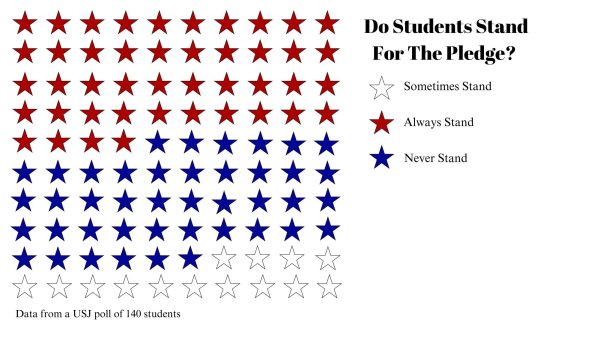I Pledge allegiance to the flag of the United States of America, and to the Republic for which it stands, one nation, under God, indivisible, with liberty and justice for all?
The Pledge of Allegiance should have no place in America’s classrooms, and yet, at 8:20 each morning, it rings through the halls of Creek. Unless you’re bringing in silencing headphones to your first period class, which is usually frowned upon by teachers, you have no choice but to listen.
Created in 1892 by minister Francis Bellamy to make immigrant students “more American,” the Pledge of Allegiance is more of a forced indoctrination. If you’re going to live in America, get in line and pledge your devotion every morning. Or, at least sit there and take it for fifteen seconds as it’s blasted over the intercom.
If you don’t stand for the Pledge of Allegiance, you’re not going to get spit on or suspended. The key phrase, the one that schools like Creek rely on to protect them from legal trouble, is “if you would like to stand.” Not “please stand for the Pledge of Allegiance,” but stand if you would like to.
If you couldn’t tell by now, I don’t like to.
But what does it really mean to pledge your allegiance? Does that mean that if you put your hand over your heart and recite the words, you’re vowing to submit yourself to the leadership of your country indefinitely? I’m proud of my country, but, in light of current events (and the possibility of an authoritarian presidency), the idea of promising my unyielding loyalty scares me.
There’s a lot of random things I’d pledge my undying love to, but I don’t think it’s safe, or smart, to promise yourself to the leadership of your country. If you’re pledging your allegiance, every day, does that mean you should be first in line at the drafting center come war? Does that mean you should enter the Army come graduation or work as a public servant? It’s unclear. The meaning of pledging your allegiance to America is purposefully vague, which also scares me. You should know exactly what you are signing up for if you put your hand over your heart every morning.
Students are not required to stand for the Pledge of Allegiance, but that doesn’t mean that its recitation from speakers in schools is not a glaring violation of the Constitution. Though I don’t support you owning an assault rifle for “legal hunting purposes,” I still believe the Constitution has its place securing the rights of Americans.
The right of students to choose whether or not to recite the Pledge protects their first

amendment right to free speech. But that same amendment protects their freedom of religion, the exact freedom that is endangered by the wording of the Constitution.
The Establishment Clause of the Constitution strictly prohibits the American government from establishing any one religious view as orthodox. A.K.A., separation of Church and State. But what does this have to do with the Pledge of Allegiance?
Under God. Under God. Under God. Those two words were what emboldened me to sit glued to my chair for those fifteen seconds for the first time, rather than standing at attention with the rest of my classmates. God has no place in public schools, but His name rings over the loudspeakers every morning anyway.
A Louisiana court recently blocked a law requiring every classroom to display the Ten Commandments, claiming it was “unconstitutional on its face” and that the law had an “overtly religious” purpose. Just making sure I heard this right- it’s unconstitutional to display the ten commandments because it’s too religious, but not unconstitutional to play over the loudspeakers an oath containing the words “under God?” Got it.
Why are we, as a country that prides itself on separation of Church and State, chanting those two words in school every morning? We don’t have minister Bellamy to thank for that, but the Red Scare. Because the worst thing that could happen is America being confused with a lesser, godless nation. Oh GOD, what could be worse than that?!
No offense, but you don’t win a purple heart for standing fifteen seconds to recite the Pledge; this routine is completely ineffective, regardless of intention. Whether you stand for Veterans, for the American Dream and equal rights, or for “building a wall,” the action is equally useless in supporting your ideals. You might have some deeply personal story on why you stand for the Pledge, and that’s your business, but it’s time to rethink how effective this choice really is, at least in the ways that matter.
Instead of allocating daily time to recite the Pledge, schools could be using that time to organize proper Veteran’s day celebrations or writing thank you notes to Veterans around school. There are much more meaningful ways to honor war Veterans than a performative chant that they don’t even hear you recite. That is, unless, every one of your teachers is a Veteran.
“Oh, but reciting the Pledge doesn’t hurt anyone!” Wrong. What does it say to the immigrant students, students with dual citizenship, and foreign exchange students? It says that to be one of us, to learn in our classrooms, you must pledge your fidelity to our nation over all else.
But back to those two words, “under God.” Whether or not it offends you personally, this language is blatantly religious and not in an inclusive way. It’s not just atheists who don’t want God shoved in their faces first thing in the morning, but people with complicated relationships with God, people who’ve experienced religious trauma, and people whose religions don’t worship God too. The harm that the specific wording of the Pledge of Allegiance does greatly outweighs any presumed benefits.
I haven’t been feeling particularly patriotic recently (for a certain reason you can probably guess), but that’s not why I haven’t been standing for the Pledge. It’s not that I’m anti-America, or anti-Veteran, or anti-God. It’s simply that I am pro-Constitution, pro-separation of Church and State, and pro-immigrants. To not stand for the Pledge is the most patriotic thing I do all day.
It’s your choice whether or not to recite the Pledge at Creek, due to Colorado law. Colorado schools are required to give a set space and time for those who wish to recite the Pledge, but not all states are like this. There are four states, Arizona, Hawaii, Vermont, and Wyoming, that do not currently require this set time for the Pledge. I don’t know about you, but I don’t consider Arizona particularly unpatriotic. Why can’t Colorado follow suit?
If America’s public schools are going to support all their students, and prevent further unconstitutional promotion of Christianity as America’s sole religion, their morning routines need to change. I don’t know about you, but I’d prefer a joke or quote over 15 seconds of alleged patriotism to start my day.
I’m not suggesting we rip down every American flag hanging in Creek’s classrooms, I don’t want that at all. I only hope we can rethink why we do the Pledge every day, and what it really means to sit or to stand for those 15 seconds.









